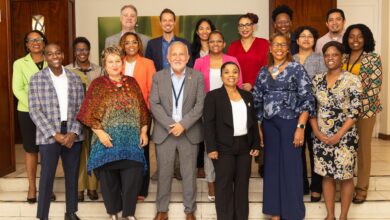I wish at the very outset to express my sincere appreciation to the International Labour Organisation (ILO) and the Government of Trinidad and Tobago for affording me the opportunity to bring these brief remarks to you at the Opening of this 8th Meeting of Caribbean Ministers of Labour.
This meeting comes at a time in the development of our Region, when we cannot but focus our collective attention on the state of our economies, in particular stymied economic growth and what seems to be a threatening future. The Caribbean Community has witnessed, in some instances, erosion of the hard-fought economic gains which our Member States have realised over time.
Among the circumstances that have contrived to lead us to this position are the global financial and economic crises, the deleterious effects of natural disasters to which our Region is prone, and skill gaps in key sectors of our economies. Of particular significance and concern is the rising level of youth unemployment which has in some instances contributed to the widening poverty gaps and rising levels of disenchantment, crime and insecurity.
It is no surprise therefore that the Thirty-Fourth Meeting of the Conference of CARICOM Heads of Government, to be hosted in this very venue later this week will devote a considerable part of its agenda to focusing on the future of our economies and examining options for charting a course for growth.
Ministers, your meeting today comes at a time when the world is examining options for the United Nations Post 2015 Development Agenda, an exercise which also provides opportunities for reflection and re-examination of development models. This is a debate in which our Member States must continue to be actively involved, given the important role which the agenda will play in advancing sustainable development in all its facets, economic, social and environmental, and in fashioning the global financing agenda for developing countries.
Consideration of Decent Work will be an important element in these discussions, given its central role in addressing poverty alleviation. The Think Piece on Employment prepared by the UN Task Team on the post 2015 Agenda notes that:
‘The availability of decent work opportunities and the capacity of women and men to take up those opportunities are central to the development process in general and poverty reduction in particular. However, decent work is more than just a means of achieving development goals. Key development objectives are thus to sustain a strong pace of employment growth and raise the earning power of the poorest’.
That Report also points to far reaching effects of decent and productive work, noting implications for sense of identity and social relations. It cites studies which show that as work becomes more decent in income terms, people are also more likely to invest in their children’s health and education as well as their own health.
There is a significant level of commitment on the part of our Member States to the achievement of decent work. All CARICOM Member States have committed themselves to the ILO Decent Work Agenda at the international, hemispheric, regional and national levels. A further step was taken, when at the Tripartite Caribbean Employment Forum, held in Barbados in October 2006, CARICOM Member States and Associate Members, together with the leaders of employers’ and workers’ organisations, adopted a Tripartite Declaration and Plan of Action for realising the Decent Work Agenda in the Caribbean.
Member States are in various stages of the development of their national Decent Work Programmes, which address different combinations of priorities based on national circumstances. In spite of significant ownership of the Programmes by the Tripartite Partners, funds and technical support and assistance to implement the Programmes remain a critical issue, especially given the dire economic conditions in many of our Member states.
As we develop our decent work programmes however, should we perhaps stop to ponder the emerging characteristics of a decent job? There are myriad forces shaping and reshaping employment and decent work in this the Twenty-First century. Foremost among these forces are the exponential rise in the dominance of new technologies in every aspect of employment and in our lives in general, the consequent changes in the nature of production and employment, the nature of work and ‘workplaces’ and the disappearance of boundaries of enterprise. There is also the question of the acquisition of new skill sets required for jobs, and the changing characteristics of poverty itself.
In addition, there is significant unemployment and under employment existing alongside acute skill shortages in some key sectors of our economies. The lack of access to technology by many of our young people has the potential to widen employment and poverty gaps, and this needs to be addressed.
The Report of the CARICOM Commission on Youth Development highlighted the voices of youth who lamented this situation, and also
pointed to the high economic cost of youth unemployment. The incidence of unemployment among the youth is higher than among the adult population. In fact the data reveals that youth unemployment rates are substantially above the national averages across the Region. Indeed it is more than twice the adult rate. A reduction in youth unemployment to the adult levels would contribute to growth of between one and two per cent in GDP among our Member States.
Further, of increasing concern in our Region, is the fact that even among those who successfully complete secondary and tertiary education, and among those who have access to technology, many are unable to secure a decent job.
This situation points in part to a mismatch between the skills required for employment and entrepreneurship, and those being developed in our education and training systems. The development of the Caribbean Vocational Qualification (CVQ), based as it is on occupational standards developed in conjunction with industry, is a step in the right direction and will render school leavers more readily employable. The CVQ also provides the impetus and opportunity for persons in the workforce to update their skills and have them certified. We need to broaden offerings within our general education system to foster creativity and innovation to enable our citizens to take advantage of emerging occupations.
There is also a more general need for access to up-to-date labour market information and intelligence and the use of this information to render education and skill training more demand driven. All of this emphasises the imperative of policy coherence and a whole of government, whole of society approach to employment goals.
Mr Chairman, Ladies and Gentlemen, as we look towards the transition of our economies, labour organisations also have a critical role to play in encouraging retooling and training to meet the new requirements and in bolstering the rate of productivity. All of these factors have a bearing on the decent work agenda.
As I conclude these brief remarks, I wish also to express to profound appreciation to the International Labour Organisation for the critical support which it continues to provide to the Region as it seeks to address not only the decent work agenda, but indeed all other labour related issues so critical to the economic well-being of our Member States and the improvement of the lives of the people of the Caribbean Community.





